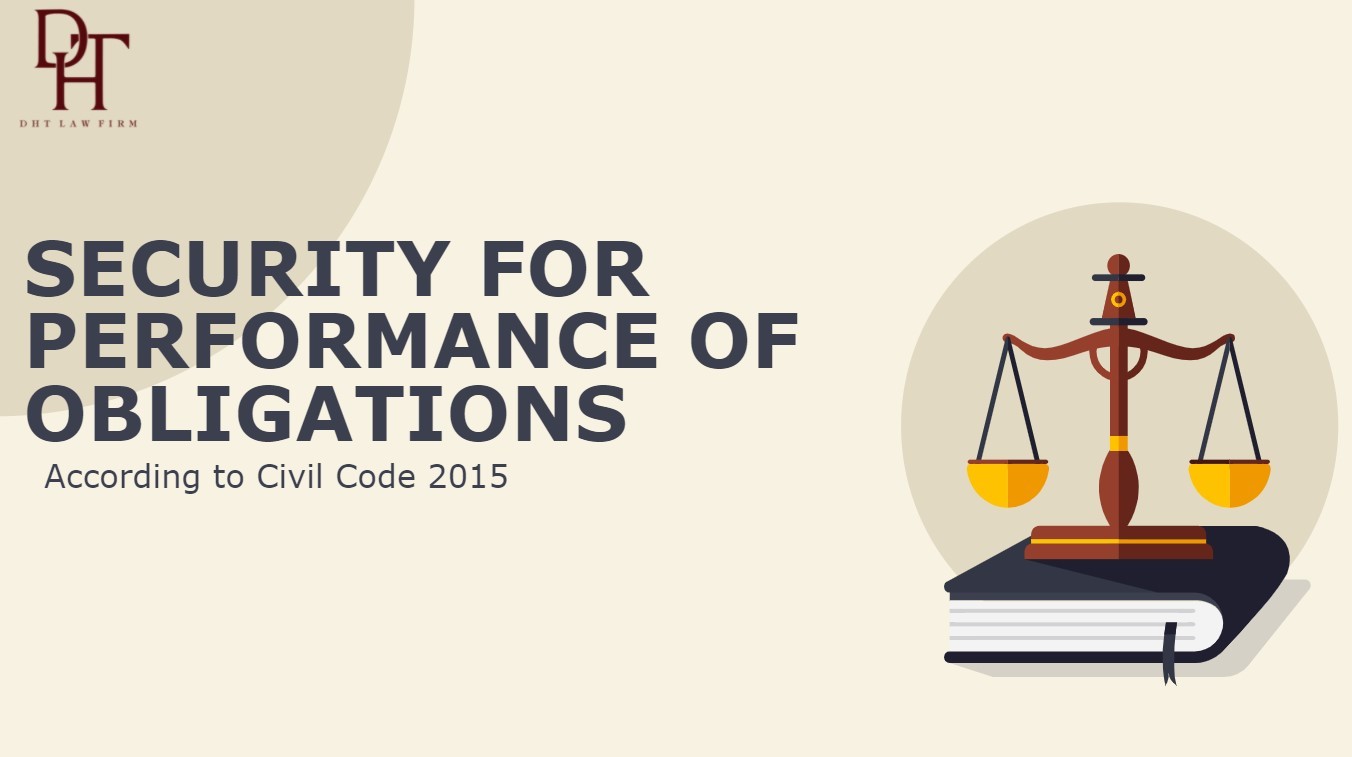
SECURITY FOR PERFORMANCE OF OBLIGATIONS ACCORDING TO CIVIL CODE 2015
In an obligation relationship, whether the obligee has the capacity to fulfill its interests or not depends entirely on the behavior of the obligor. Therefore, with the goal of ensuring that the obligor properly and completely performs its obligations and protects the interests of the obligee, Vietnamese law prescribes security measures to protect the interests of the obligee in a civil relationship.
- What is security for performance of obligations?
The Civil Code 2015 has failed to provide a definition of security for performance of obligations, however, it can be defined as a measure in which a party uses property under its ownership or uses its reputation (hereinafter referred to as securing party) to secure the performance of a civil obligation of its subject or another entity (hereinafter referred to as the secured party).
- Types of security for performance of obligations
Article 292 of the Civil Code 2015 stipulates 09 types of security for performance of obligations, including:
- Pledge of property means the delivery by one party (hereinafter referred to as the pledgor) of property under its ownership to another party (hereinafter referred to as the pledgee) as security for the performance of an obligation.
- Mortgage of property means the use by one party (hereinafter referred to as the mortgagor) of property under the ownership of the obligor as security for the performance of an obligation to the other party (hereinafter referred to as the mortgagee) without transferring such property to the mortgagee.
- Deposit is an act whereby one party (hereinafter referred to as the depositor) transfers to another party (hereinafter referred to as the depositary) a sum of money or precious metals, gemstones or other valuable things (hereinafter referred to as the deposited property) for a period of time as security for the entering into or performance of a contract.
- Security collateral is an act whereby a lessee of a movable property transfers a sum of money or precious metals, gems or other valuable things (hereinafter referred to as security collateral property) to the lessor for a specified time limit to secure the return of the leased property
- Escrow deposit is an act whereby an obligor deposits a sum of money, precious metals, gems or valuable papers into an escrow account at a credit institution to secure the performance of an obligation.
- Title retention: In a sale contract, the ownership of property of the seller may remain until the buyer pays the purchase price in full.
- Guarantee means an undertaking made by a third person (hereinafter referred to as the guarantor) to an obligee (hereinafter referred to as the creditor) to perform an obligation on behalf of an obligor (hereinafter referred to as the principal debtor) if the obligation falls due and the principal fails to perform or performs incorrectly the obligation.
- Fidelity guarantees: A socio-political organization at the grassroots level may provide a fidelity guarantee in order that poor individuals and households are able to borrow sums from banks or other credit institutions for purposes of production, business or provision of services in accordance with the regulations of law.
- Lien on property means that the obligee (hereinafter referred to as the lienor) who is legally possessing the property being an object of a bilateral contract is entitled to retain the property when the obligor fails to perform the obligations or has performed the obligations not strictly as agreed upon.
Therefore, in case the parties agree on other measures that are not included in the above 09 security measures, they are illegal. This is inconsistent with the free will of the subjects when entering into secured relationships.
- Scope of security for performance of obligations
An obligation may be fully or partly secured, as agreed or as provided by law. If there is no agreement on or if the law does not provide, the scope of the security, the obligation, including the obligation to pay interest and to compensate for any damage, shall be deemed to be fully secured. Secured obligations may comprise current obligations, future obligations and conditional obligations. With respect to a future obligation which is going to arise within a guaranteed time limit, it shall be the secured obligation, unless otherwise agreed.
- Collateral
Article 295 of Civil Code 2015 stipulates 04 conditions for collateral as follows:
- Collateral must be under the ownership rights of the securing party, except for the cases of lien on property or title retention.
- Collateral may be described generally but must be identified.
- Collateral may be existing property or off-plan property.
- The value of collateral may be greater, equal or smaller than the value of the secured obligation. And it is important that the asset is tradable, has value and liquidity.
- Security interests subject to registration
In principle, a security interest is registered under the agreement of the parties or as required by law. When registering a security interest, the secured party has the right to recourse to the security property and the right of priority to make payment in case the security interest has effectiveness against third parties.
The following security interests are subject to registration:
- Mortgage of land use rights;
- Mortgage of property on land whose ownership has been stated in the certificate of rights to use land, ownership of house and property on land (hereinafter referred to as land use right certificate);
- Pledge or mortgage of aircrafts;
- Mortgage of seagoing ships.
The following security interests are subject to registration upon requests:
- Mortgage of other personal/movable property;
- Mortgage of off-the-plan property on land;
- Title retention in case of purchase of property on land, off-the-plan property on land; purchase of aircrafts, seagoing ships; or purchase of other personal/movable property with title retention.
- Realization of collateral
The Decree No. 21/2021/ND-CP on elaborating to the civil code regarding security for the fulfillment of obligations stipulates generally about realization of collateral as follows:
- Realization of collateral must conform to agreement of parties, this Decree and relevant law provisions.
- In case collateral is right to extract minerals or right to extract other natural resources, realization of collateral must conform to regulations and law on minerals, other natural resources and relevant law provisions.
- In case secured parties realize collateral on the basis of agreements under security contracts, letter of attorney or written consent of securing parties is not required.
- In case the Civil Code or other relevant law provisions prescribe properties used as security must be realized to enable securing parties to fulfill other obligations, the properties shall then be realized according to said regulations.
- Realization of collateral conducted by secured parties to recover debt is not a business activity involving properties of the secured parties.
In addition, Vietnamese law also has detailed and specific regulations on the procedure of realization of collateral. If you have any questions about this issue, do not hesitate to contact us for accurate and professional advice.
